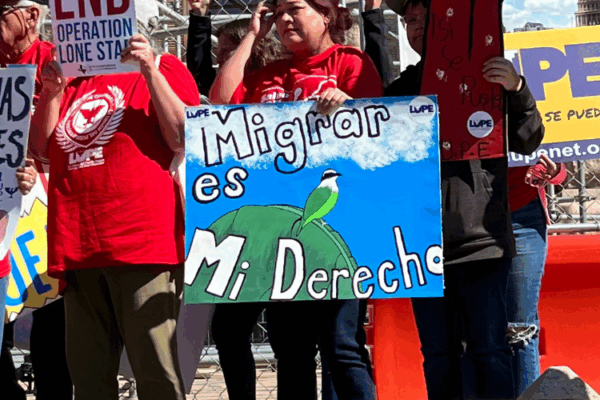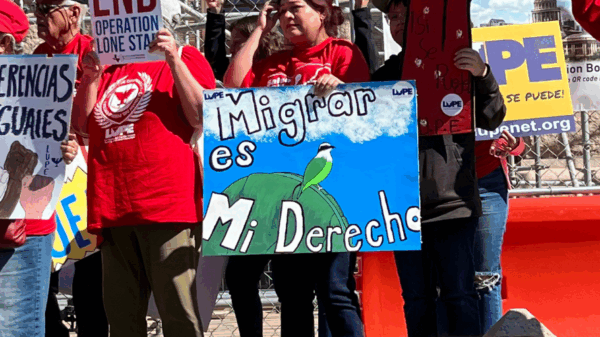This content is intended to serve as general information; it is not legal advice nor intended as legal advice.
IMPORTANT UPDATE: S.B. 4 is not in effect.
This could change. We will regularly update this page with the latest information about S.B. 4 and your rights. Last date updated: March 27, 2024, at 12:00 p.m. CT.
Click here for Know Your Rights information about SB4 passed in 2017.
What is Senate Bill 4 (S.B. 4)?
S.B. 4 was passed in November 2023 during a special Texas legislative session. The unconstitutional law is one of the most extreme pieces of anti-immigrant legislation any state legislature has ever enacted.
What will this law do?
S.B. 4 is not in effect.
This new law authorizes untrained police officers to engage in immigration enforcement. It creates a new unconstitutional process in which the police in Texas are permitted to detain people suspected of being non-U.S. citizens and entering or attempting to enter Texas from Mexico or another country without authorization. Police may charge individuals with a new state crime of “illegal entry” to Texas, punishable by up to 6 months in jail. Police may charge individuals previously denied admission to the U.S. or deported from the U.S., including those unlawfully deported by Texas, with “illegal re-entry" to Texas, punishable by up to 10-20 years in prison.
The law also authorizes – and in some cases requires – Texas judges, who are not trained in immigration law and have no proper authority to enforce it, to order individuals deported under certain circumstances. Individuals who fail to leave the United States may then be charged under a new crime of refusing to comply with the state’s deportation order, punishable by 2 to 20 years in prison.
Now that the bill has been signed by Abbott, am I at risk?
S.B. 4 is not in effect.
S.B. 4 places our communities and those traveling in Texas at higher risk of racial profiling and overpolicing. In that respect, we are all at risk, but our Brown and Black communities are at greater risk of enforcement of this cruel and unlawful law.
When will this law go into effect?
S.B. 4 is not in effect.
The U.S. District Court for the Western District of Texas initially blocked this unconstitutional law from going into effect. However, the Fifth Circuit Court of Appeals administratively stayed that decision and the U.S. Supreme Court declined to review that order. S.B. 4 was allowed to take effect Tuesday, March 19, 2024. The Fifth Circuit Court of Appeals then dissolved their previous administrative stay, reinstating the district court’s injunction and thereby blocking the law from retaking effect. Finally, the Fifth Circuit Court of Appeals ruled to keep the block on S.B. 4 while our lawsuit to strike the law down unfolds.
Can Texas law enforcement ask me about my immigration status?
S.B. 4 is not in effect.
With the new offenses created by S.B. 4, police officers will in some cases have grounds to ask people whether they entered Texas from another country illegally. Remember, that generally you have the right to remain silent if a police officer stops you and asks you questions. If you are stopped while driving, you must provide the officer with your license or identifying information — specifically your name, date of birth, residence address, and driver’s license number. If you are lawfully detained, arrested, or a witness, you may not intentionally give a false or fictitious name, date or birth, or address to officers. Continue reading the next question for more information on your right to remain silent.
What should I do if I am stopped by local or state police?
S.B. 4 is not in effect.
If you are stopped by local or state police or are arrested, it’s important to know your rights. Remember that you have the right to remain silent and, generally, do not have to answer any questions about your immigration status, where you were born, or how you entered the country. You should never give an officer a false document or lie to law enforcement.
Depending on your immigration status, you may be required to carry documents reflecting that status. We suggest you consult with an attorney to determine whether you have an obligation to carry documentation with you.
If you are stopped while driving and do not provide a driver’s license when a police officer asks for it, you will need to provide, if asked by the officer, your: name, driver’s license number, residence address, and date of birth.
We recommend that you carry documentation with you if it proves:
- You are legally lawfully present in the United States;
- You have asylum; or
- Are the beneficiary of DACA benefits
What are students’ and parents’ rights under SB 4?
S.B. 4 is not in effect.
S.B. 4 prohibits its enforcement in certain locations, including a public or private primary or secondary school; a church, synagogue, or other established places of worship; a health care facility; and SAFE-ready facility.
What happens if a police officer believes that I have entered or reentered the country illegally?
S.B. 4 is not in effect.
If a police officer believes that you have entered or reentered the country illegally, you can be arrested and taken to a magistrate. The magistrate may ask you to agree to a state deportation. You have the right to agree or not to agree to removal, and you can invoke your right to remain silent and ask for the appointment of an attorney. If you do not agree to a state deportation, you can be taken to jail and have a bond set. In many cases, a person will have the continuing right to agree to a state deportation, or to challenge their prosecution through an attorney. You have the right to seek help from an immigration attorney even if you are incarcerated by Texas. It is important to consider the practical and legal impacts of a state deportation before waiving your rights to remain in the United States, defend against the state prosecution, and assert your rights to immigration relief.
Is an Agreement of Removal a deportation?
S.B. 4 is not in effect.
A state removal order is a demand from the state for a person to go back to the country that they are accused of having entered from. Because states do not have the constitutional authority to deport people, we don’t know how S.B. 4 will affect a person's future eligibility for federal immigration relief.
What happens if I fail to return to my country of origin after an Agreement of Removal?
S.B. 4 is not in effect.
The order of removal only requires you to go back to the country you are believed to have entered from, which will likely be Mexico. This may not be your country of origin. Because you may be removed to a country you are not from, that country will need to decide if you have legal permission to enter and stay. If they do not let you stay, or if you decide for another reason to return to the United States after being issued a state order of removal, Texas may attempt to prosecute you for refusing to comply with a removal order. Because Texas is taking several complex steps, it is critical that you ask for a criminal defense attorney to help you weigh your options. If you are able to, you may also access the jail facility’s law library or seek a separate immigration attorney. These resources may help you decide whether to challenge your prosecution or seek relief from the United States.
What are my rights when considering an Agreement of Removal?
S.B. 4 is not in effect.
You have several rights when deciding whether to “agree” to be removed:
- You have the right to remain silent. You have the right to refuse any interview without an attorney.
- You have the right to be represented by an attorney. In your criminal prosecution, an attorney will be appointed to you if you cannot afford one.
- You do not have a right to a court-appointed immigration attorney, but you have the right to seek one for yourself.
- You have the right to access the jail’s law library and to send (paid) communications. Together with your attorney(s), these resources will be critical to deciding whether and how to defend against prosecution and petition the United States to stay.
Stay Informed
Sign up to be the first to hear about how to take action.
By completing this form, I agree to receive occasional emails per the terms of the ACLU’s privacy statement.
By completing this form, I agree to receive occasional emails per the terms of the ACLU’s privacy statement.


